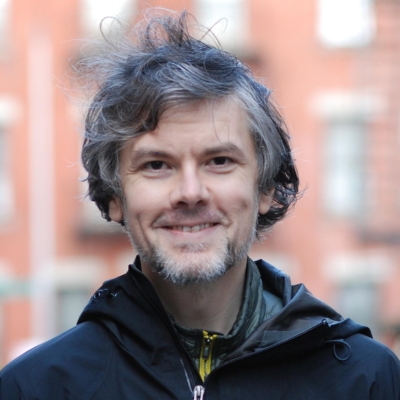Jason Ellis is the 2023 School of Literature, Media, and Communication Distinguished Alumni Award recipient. Learn more about the annual award ceremony.
1. What do you do?
I have several primary responsibilities as a college professor at the New York City College of Technology (City Tech). First, I design and teach a rich variety of classes ranging from English composition to technical writing, law through literature to science fiction, and digital storytelling to writing with new media.
Second, I direct our Bachelor of Science in Professional and Technical Writing program, which prepares students for jobs as technical communicators, professional writers and editors, and other communication-focused careers.
Third, I coordinate the City Tech Science Fiction Collection, an over 650 linear foot collection of science fiction magazines, anthologies, novels, monographs, and journals.
Lastly, I've co-organized the annual City Tech Science Fiction Symposium for the past seven years, which brings together scholars, editors, authors, and students to discuss why and how science fiction matters to our world.
2. What's the coolest part of your job?
The coolest part of my job is connecting with people. I love connecting with my students by having them hold and read science fiction magazines that are four times their age, building something with LEGO together in a technical writing class, or tinkering with some of the old computers in my retrocomputing collection. Sharing things that I believe are important and interesting makes learning a lot more fun!
Also, my work has given me opportunities to meet some of my heroes: astrophysicist Neil deGrasse Tyson spoke with me about science fiction and society on his StarTalk Radio show; Ted Chiang, the author of Story of Your Life, which was adapted into the film Arrival, met me for breakfast where I enthused over his story that I share with students, The Truth of Fact, the Truth of Feeling; and celebrated science fiction writer Samuel R. Delany joined us as the keynote speaker for the second City Tech Science Fiction Symposium in 2017.
3. Why are you passionate about it?
My passion for being a college professor is deep-seated in my experience as a first-generation college graduate.
It was challenging for me — it took me over ten years to "get out" of Georgia Tech! I don't want to see other students, especially first-generation ones, struggle in the same way as I did so that they can move forward confidently and reach their educational, career, and life goals.
While I want to help my students graduate more quickly than I did, I can positively say that those extra years gave me plenty of time to learn how to be an effective and supportive professor from the best in IAC!
4. Which skills from Georgia Tech and your IAC degree have helped you be successful in this career?
Build relationships with mentors in my own and adjacent fields. Be a compassionate listener and support others to solve challenges impeding their success. Meaningfully collaborate with colleagues. Break large projects down into smaller, manageable parts that follow a plan with deadlines, delegated responsibilities, and accountability.
Don't drop the ball — follow through on professional commitments — not for your own sake but because others are relying on your contributions. Say "yes" to new opportunities, but be prepared to say "no" to avoid over-committing yourself or joining a project that doesn't align with your long-term goals.
5. What's your #1 tip for students and alumni interested in your field?
I think everyone should be reading more science fiction because it gives us language and ideas that help us grapple with the effects of rapid scientific and technological change on our lives, relationships, and culture.
The thing about science fiction is that it isn't ever about the future or other planets. It's always connected to our here and now, which serves as the initial starting conditions (explicitly or implicitly) for the story's extrapolation.
Science fiction is about us, but under the guise of aliens, robots, and ray guns. And there are ongoing, exciting developments in the field — it is becoming more diverse, inclusive, and representative, which means there are more incredible writers with different perspectives and lived experiences creating amazing science fiction. For the cutting edge, go to the magazines — Analog Science Fiction and Fact, Asimov's Science Fiction, and The Magazine of Fantasy and Science Fiction — and check your favorite bookstore for new and upcoming science fiction writers!
Meet more alumni in the School of Literature, Media, and Communication!

Profile type: Alumni
Degree: B.S. Science, Technology, and Culture (now Literature, Media, and Communication)
Job Title / Employer: Associate Professor of English and Director of the B.S. in Professional and Technical Writing Program at the New York City College of Technology, CUNY in Brooklyn, New York
